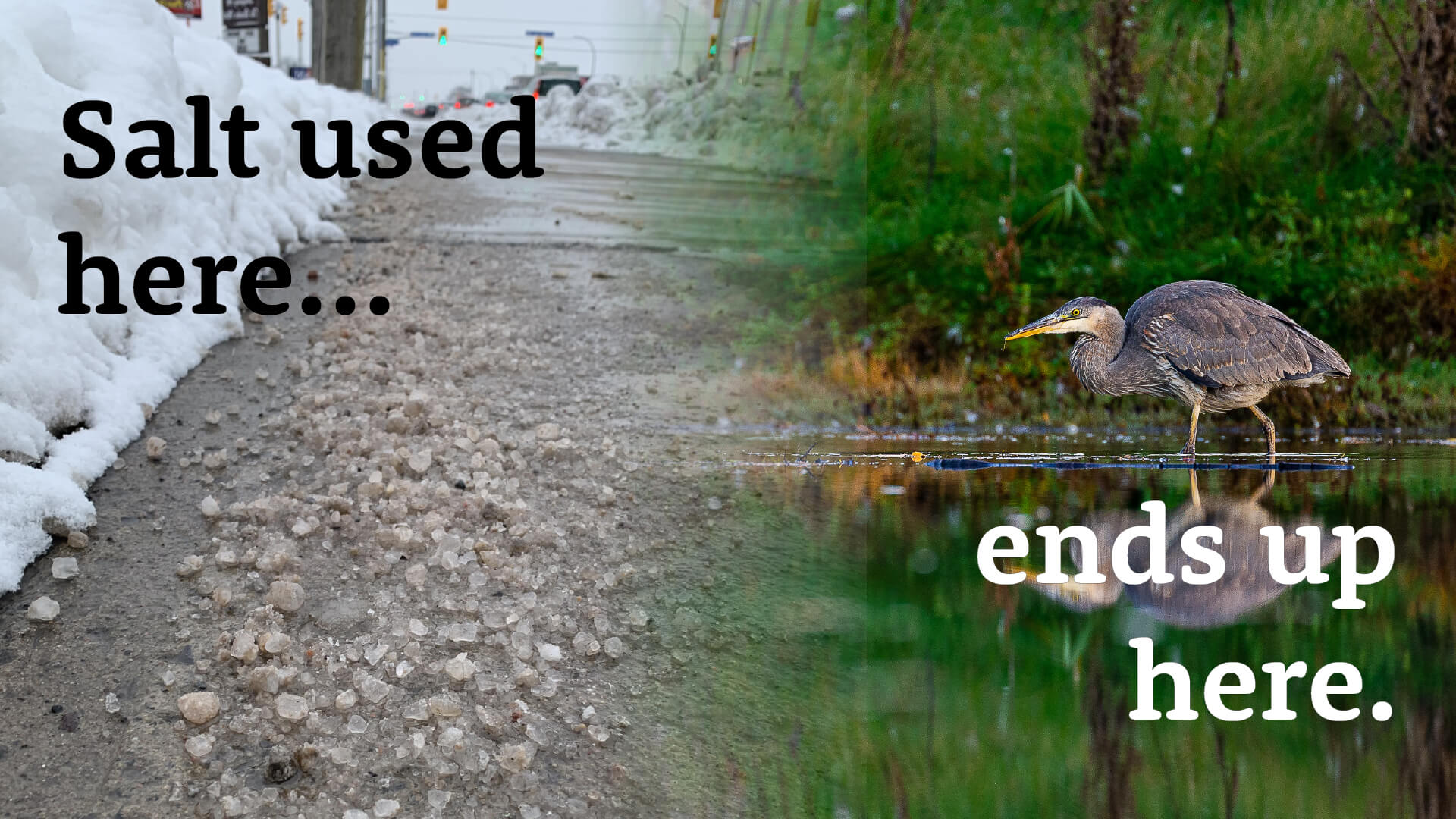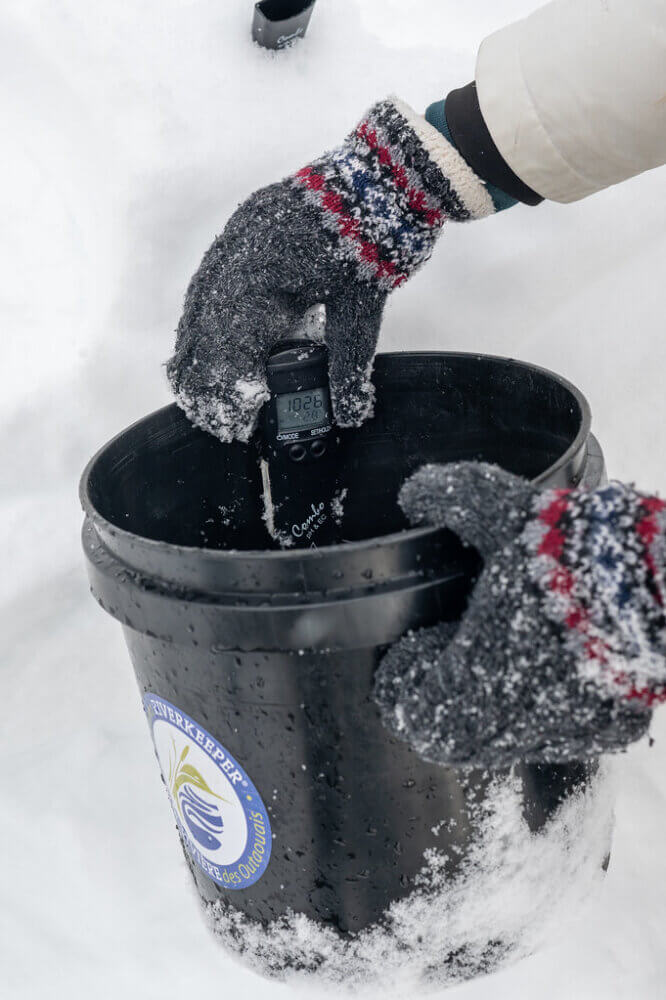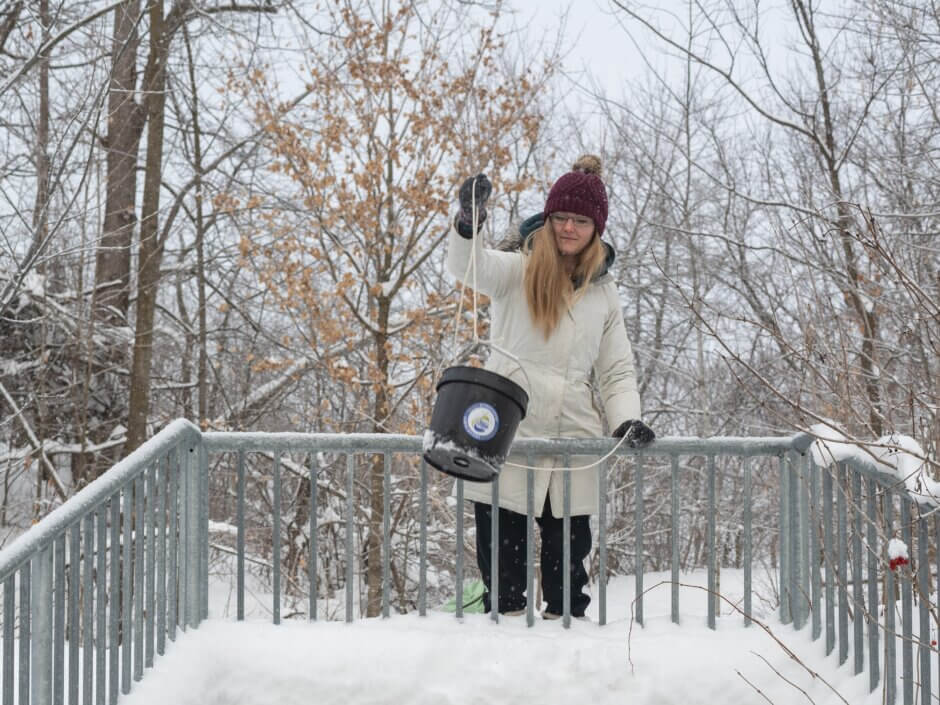Posted: January 30, 2023
Ottawa Riverkeeper launches Road Salt Reduction Week!

Ottawa Riverkeeper is sharing information, facts, and tips about road salt during the week of January 30th, as part of an ongoing effort to raise awareness of the negative impacts that overusing road salt has on freshwater ecosystems.
Ottawa – January 30th, 2023. Today, Ottawa Riverkeeper launches Road Salt Reduction Week, a chance for watershed residents to learn more about a major danger to our local waterways. Road salt is harmful to freshwater ecosystems – in large quantities it can be extremely toxic. Ottawa Riverkeeper’s own monitoring over the past three winters has clearly demonstrated that these conditions are ubiquitous and persistent in the national capital region. Now we want to raise awareness to encourage a change in behaviour towards less salt use.
Ottawa Riverkeeper has relied on dedicated community scientists to monitor the impact of road salt on their local waterways since January 2020. Although levels of chloride vary over the course of the winter, over 80% of the samples we have collected indicated levels of salt above the thresholds that are toxic to their ecosystems. These results have remained steady over the years of our study, including as we expanded it with the help of more volunteers, indicating that this is a persistent issue that will not be solved without action.

“These results are alarming! Road salt is clearly overused in Ottawa. We have seen our creeks reach very high levels of toxicity, and now it’s time for Ottawans to reduce their use of road salt for the sake of our freshwater.“ – Laura Reinsborough, Riverkeeper and CEO.
Overuse of road salt is a fixable problem. If governments, businesses, and the general public understand how and why to use proper salting techniques, we can make great strides toward protecting our beautiful rivers, creeks, and streams.
From January 30th to February 5th, Ottawa Riverkeeper will be out in the community, talking to community groups and residents about the issue. We also invite the public to follow along on social media as we share facts about road salt, as well as simple ways to reduce your use.
Our community scientists are actively monitoring local creeks this winter, and preliminary results once again indicate high levels of toxic chloride in urban waterways. All of Ottawa Riverkeeper’s chloride data is available via our Open Data Portal, and results from the 2022-2023 season will be added at the end of the monitoring period.

We would like to thank the Ottawa Community Foundation for providing the funding for our awareness campaign this year. To access all our information about road salt, please visit ottawariverkeeper.ca/salt.
– 30 –
About Ottawa Riverkeeper
Ottawa Riverkeeper, a charitable organization, is a champion and collective voice for the Ottawa River watershed, providing leadership and inspiration to protect, promote and improve its ecological health and future. Expert and independent, our organization advocates for responsible and participatory decision-making, public education, access to information, and compliance with protective regulations. Guided by a science-based approach, we provide clear information with the aim to engage the public and empower citizens and decision-makers to ensure clean, healthy, and accessible water for all people and species.
For more information:
Matthew Brocklehurst, Communications Manager
media@ottawariverkeeper.ca

Great article.
I hope you are going to talk to OC Transpo. about their overuse of salt at shelters and on the LRT.
It is absolutely fixable.
Barry
Because of your enlightening newsletters, today we bought a de-icer that was environmental friendly at Canadian Tire. It was about three times more expensive than the salt that was on the shelves. We bought it anyway, but I would like to point out that there are many people, maybe even MOST people, who cannot afford to do that especially in our present climate of rising costs. Might I suggest that besides encouraging folks to find alternatives to using salt that an effort should be made to petition the appropriate agencies- government perhaps, or manufacturers to make alternatives affordable. I’m sure there are many people that are interested in helping the environment but sometimes putting food on the table has to take precedent.
Why aren’t we using beet brine on our roads, sidewalks and driveways?
Hello Phyllis, thank you for your comment! You raise some excellent points, and I appreciate your dedication to protecting our shared waterways though the use of an alternative to road salt. That is a great step!
While alternatives are a fantastic way to reduce the salt entering our streams, our primary focus is on educating people on how to use road salt more effectively. Many people put down way more than they need; we always say that a single coffee mug full is enough for a whole two-car driveway! Additional tips include shovelling early to prevent ice buildup and using sand or gravel instead for traction. Plus, salt doesn’t work well below -7 degrees, something many people don’t know, so applying it at those temperatures is just throwing it away. Applying road salt properly should actually save money since you’ll be using less of it!
Please talk to OC Transpo. Their use of salt has increased dramatically in recent years. It is quite shocking to see piles of salt all around the stations or stops. A small fraction of salt would do the job.
I commend you but your efforts aren’t working, at all. We’re going backwards. In many cases more salt is applied than the snow they are attempting to remove. 60 000 km of roads in Ottawa and the city seems determined to melt every snowflake. A skiff of snow and the equipment armada is unleashed to chemically attack it. Our fish, invertebrates, pet’s paws, etc etc etc don’t stand a chance. Good luck but you’re speaking to the converted and pissing in the wind.